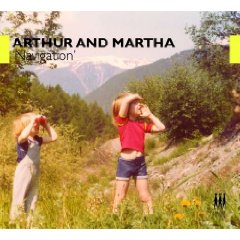The mise-en-scene says it all. A mown grassy plain, a scattering of fallow trees across the horizon. The sky is a uniform English grey. In the foreground, Arthur and Martha – aka Adam Cresswell and Alice Hubley – stand a little unsure on their feet. He’s in matching khaki socks and combat shorts, she’s wearing a white vintage dress and cream-coloured cardigan. Her deep red lipstick matches his v-neck knitwear. With a London A-Z in his hand, ‘Arthur’ looks perplexedly off into the distance with furrowed brow. ‘Martha’, clutching an old school toy robot to her chest, eyes nearly obscured by floppy fringe, stares straight at us, lips ever so slightly parted. They look an odd sort of couple, his orienteering dad-ishness, her childlike, nervous sexuality. It could be a scene from a 1960s kitchen sink drama but for the patent absurdity of it – why use an A-Z to find your way when you’re standing in a park? And then there’s that robot, harboured like a fetish, speaking of a childhood older than Adam and Alice’s, a nostalgia for some lost futurity, when Robbie the Robot and the electronic music of Louis and Bebe Barron made natural bedfellows.
Arthur and Martha, self-confessed ‘swingers with synthesizers’, counterpose a peculiarly English, suburban fustiness to the teutonic severity of Kraftwerk. Less bachelor machines than happy domobots, singing along to sping-cleaned synthesizer sounds, free of the fuzz, dirt and grime of contemporary electronic pop music. Not that Navigation is so sanitary as to be aseptic. On the contrary, it has a warmth and a cosiness that bears the trace of Adam and Alice’s previous lives in indiepop groups, Saloon and The Duloks. In fact, oft though it may be cited, the Kraftwerk reference may be misleading. ‘Autovia’ could just as well refer to a short-lived make of 1930s English luxury car as a Spanish motorway sign. The bedsit anomie of ‘Vallorian’ might better lead us to Soft Cell, swapping Marc Almond’s strained Lancashire croon for Alice’s nasal Yorkshire brogue; while the twanging, top-of-the-neck bassline and stuttering rhythm pads of ‘Turn to Dust’ irresistably evoke New Order. To the sugar pop melodies and modernist simplicity of 80’s synthpop, Arthur and Martha add the same analogue fetishism that inspired the Birmingham Moog scene of the mid to late 90s. The inner sleeve proudly lists the vintage systems they used (ARP Quartet, Juno 60, Korg Microkorg, Moog Opus 3, &c.), and more than one backing track recalls the cosmic lullabies of Plone and Pram. ‘Squarewave to Heaven’ shares its swirling synth squiggles and motorik pulse with the Stereolab of Transient Random Noise Bursts with Announcements, while the Nintendo euphoria and harmonised ooh-ahs of ‘Follow the Path’ might not have sounded out of place on one of the ‘Lab’s later releases.
On other tracks, however, a different side to the duo emerges that may be less familiar to fans of their live shows and early singles. ‘Kasparov’ and the title track leave behind the flashing lights of the indie disco and take us out into the woods, towards the haunted lo-fi pastorale of Hood (whose founder members, brothers Chris and Richard Adams contributed a remix to last single Music for Hair Products). Picked acoustic guitars and library music samples nested amongst a doloroso clarinet line and bitterly plaintive vocals, crisp with third-harmonic distortion. Much as I usually resent the tendency of many bands to include a few sops to diversity when making a ‘proper’ album, arresting the pure rush of sonic manifesto-making, ‘Navigation’ and ‘Kasparov’ are far from the panic-balladeering that infects the latter halves of many an otherwise fine pop record. They don’t so much interrupt the journey as point out a particularly nice view through the window. Whether exploring new directions or traversing more familiar ground, Navigation proves that Arthur and Martha have not lost their way. A joyous debut, equally assured as soundtrack to a tear-stained pillow or as spur to the dancefloor.


